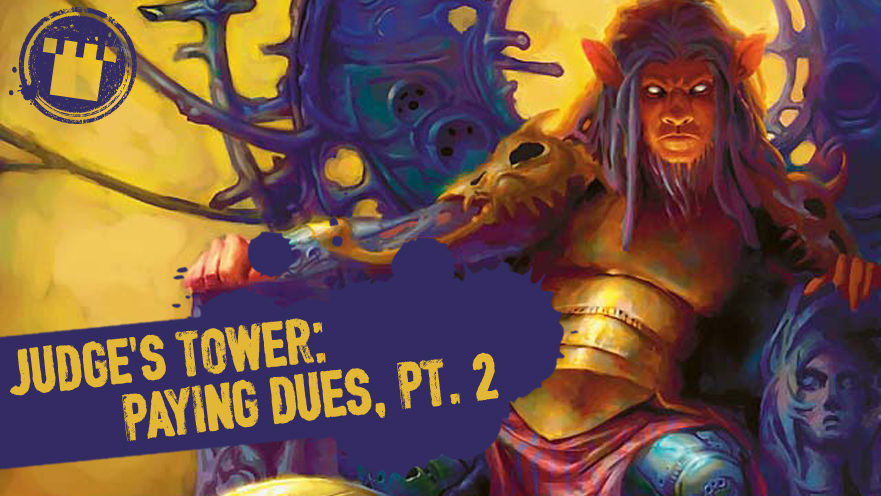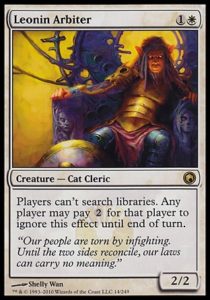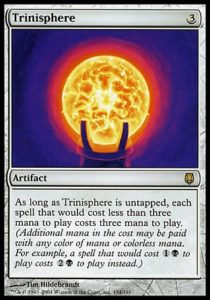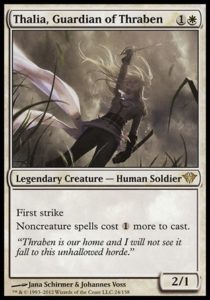Hello again! Last time we climbed the Tower, we went over how a card like Thalia, Guardian of Thraben works in a variety of situations. When I set out to write that article, I was thinking I was going to be able to cover more ground, but as I realized how often I get Judge calls about how Thalia works, I kept having more and more to say.
This week, we’ll take a look at another Modern staple of Death and Taxes-style decks: Leonin Arbiter.
SCENARIO 1
Ace is playing Sneak and Show against Noel’s R/W Prison deck at a Competitive REL tournament. On Ace’s upkeep, Noel activates an Aether Vial, and puts Leonin Arbiter on the battlefield. Once that resolves, Noel Ghost Quarters away one of Ace’s lands. Ace floats a mana from the land, then puts it in their graveyard. Ace then taps another land, says “pay for Arbiter,” and picks up their deck and begins to search. Noel immediately calls a Judge, contesting that it’s too late for Ace to pay to search. Is Ace too late?
ANSWER
Short version: Yes. Ace missed their chance to pay by a hair.
Long version: If we’re going to talk about Leonin Arbiter, that means we get to talk about Special Actions! What are those, you ask, hypothetical reader I’m using to segue to the next bit? I’m glad you asked! Enough with the exclamation points!
A player may take a Special Action any time they have priority, and taking a Special Action does not use the stack (and so can’t be responded to). According to the rules (Section 115), the eight types of special actions are as follows:
- Playing a Land for your turn.
- Turning a Morph card face-up.
- Paying to stop a continuous effect or delayed triggered ability. For examples, look at Glass Asp or Quenchable Fire.
- Paying to stop the effects of static abilities…like Leonin Arbiter.
- Activating Circling Vultures ability. Yup, an entire subsection of a rule for one card. Hooray early Magic!
- Suspending a card.
- Rolling the Planar die in a Planechase game.
- Revealing a face-down Conspiracy in the Command Zone.
The important bit of all of that, at least for our scenario, is that Special Actions can be taken when a player has priority. By putting their land in the graveyard, Ace has moved into the resolution of Ghost Quarter’s ability – and Special Actions can’t be taken in the middle of the resolving something else. If Ace had paid both mana in response to the Ghost Quarter activation, they’d have been fine. As it is, Ghost Quarter is going to fully resolve before they get another chance to pay, meaning they can’t search in time.
And that’s…actually about it for Leonin Arbiter. Once you get how Special Actions work, everything about the card is pretty much covered.
So, moving on to another card that can cause a lot of Judge calls, it’s everyone’s favorite three-ball, Trinisphere!
SCENARIO 2
It’s the middle of the next game of the match. On their turn, Ace casts Show and Tell. Both players reveal what they’re putting in simultaneously; Ace lays down Omniscience, and Noel puts in Trinisphere. When Ace goes to cast their next spell, what will they have to pay?
ANSWER
Ace will have to pay at least three mana for any spell if Trinisphere is on the battlefield, whether Omniscience is there or not.
Expanding a bit on one of the steps of casting a spell that we covered last week, the relevant rule in this case is 601.2f. Paraphrasing a bit, it states that when you determine the costs of casting a spell, you do so in this order: Take the base cost, then add anything that would make it cost more, then subtract anything that would make it cost less. Once you’ve gotten that far, “any effects that directly affect the total cost are applied.”
This is where Trinisphere comes in. All Trinisphere cares about is that you pay three mana for any spell. Doesn’t matter if a spell costs one mana and you’re paying a kicker (which counts as an additional cost). Doesn’t matter if you’re casting a two-cost spell and paying the Thalia tax. As long as you are going to be paying three total mana for whatever reason, Trinisphere’s requirements are met.
While additional costs count towards Trinisphere, alternative costs do not (unless they meet the three-mana criteria by themselves). If Trinisphere is on the battlefield, then Force of Will’s alternative cost becomes “Pay 1 life, exile a blue card from your hand, and pay three mana.”
BONUS SCENARIO BECAUSE I SHOULD HAVE BROUGHT THIS UP WITH THALIA LAST TIME
Same as the previous, with a twist! Ace casts Show and Tell, and puts in Omniscience. Noel puts in Thalia, Guardian of Thraben this time instead of Trinisphere. Does Ace have to pay the Thalia tax for any noncreature spells they cast?
ANSWER
Yup! Thalia tax happens at the same time the Trinisphere effect would occur – it’s the last thing you look at when determining the total cost of a spell. So hopefully for Ace, they already have an Emrakul, The Aeons Torn or Griselbrand in hand; otherwise, Noel might have a shot at turning the tide.
I kind of wish I had waited until next March or April to write these last two articles, so I could make a joke about you being ready to pay your taxes now. I am a Judge, after all, we’re obligated to make bad jokes whenever we can. Anyway, that wraps it up for now. See you next time!

Chris is the Marketing Communications Coordinator (and editor of the blog) at Card Kingdom. He would like to apologize to his son for not holding onto more cards from when he first started playing, as that likely would have paid for college. He enjoys pretty much all formats of Magic, but usually ends up playing decks that make other people dislike playing those formats with him.




